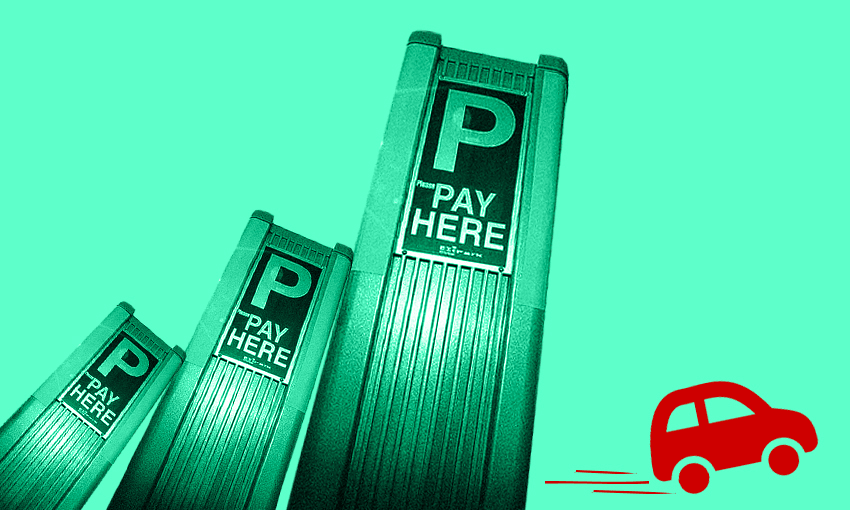Pinged $65 for overstaying 10 minutes in a parking block? Put away your hard-earned cash and read this first.
Hopefully, by now, I’ve already established myself at The Spinoff as the resident tightarse, determined to avoid all unfair and unnecessary punishments (see: oversize baggage charges). Today, I’m focusing my attention on a similarly evil institution – the parking fine.
I have to make clear from the outset that while I have a law degree, I am most definitely no lawyer, so this is assuredly not legal advice. Secondly, if you’ve been pinged by the local council or the police you should probably just pay up (unless you genuinely have an objection). My issue is with private car parks, whether it be a 10-storey eyesore or an empty lot surrounded by high rises.
The most important and continually useful part of my five years studying law (you can see why I pivoted into journalism) was the moment when I learnt that private companies cannot fine you unfairly for a parking infringement.
The keyword, though, is “unfairly”.
When you enter a parking building you form a contractual agreement with the company to pay the amount stipulated on the terms and conditions. So, if it says $5 for an hour you are contractually obligated to pay $5 for every hour you stay there.
If you overstay your hour and are slapped with an exorbitant fine, you are only obliged to pay what you reasonably should have paid for the amount of time you overstayed.
That means the private company can only recoup the amount it missed out on by you not paying, along with maybe the administrative cost of pinging you for it. If the hourly rate for parking was just $5, it’s hard to see how staying an extra half an hour warrants a $65 penalty. How much would the parking wardens have to be getting paid for that to be cost of recouping expenses!?
Consumer NZ’s Jessica Wilson agrees, saying that private car park operators “can’t just impose any rules they want”. Under the Fair Trading Act, the terms and conditions have to be fair. “They also have obligations under the Consumer Guarantees Act to carry out their services with reasonable care and skill,” says Wilson.
“Complaints we get typically involve situations where the consumer has attempted to do the right thing – they’ve paid the parking fee and parked where they thought the signage indicated they should park – only to find they’ve been stung by a $65 breach notice.”
Wilson says that private car park operators will often claim that you have accepted the risk of being ticketed if you choose to overstay in their car park since there were clear signs warning this would happen if you didn’t observe their rules.
“Payment demands may also put people off making a complaint. These demands can look like official fines but car park operators have no legal authority to impose fines. They can only really claim damages for breaches of their terms and conditions,” explains Wilson.
Wilson’s advice is simple: first, try and fight your case directly with the parking company if you think you’ve been unfairly stung. If that doesn’t work – although from experience it should, –you can always take the matter to the Disputes Tribunal.
“The downside is there’s a $45 filing fee to lodge a claim,” Wilson says. “This can deter people with legitimate claims – paying $45 to dispute a $65 breach notice may not seem worth it.”
She adds: “We think it should be much easier for consumers to dispute fees. Making the $45 tribunal fee refundable would be a good start.”
This information is all well and good, but does it actually work? Where’s the proof, I hear you ask. I put my car on the line for research purposes and have the receipts to show (eg about two years ago I got a parking ticket and I managed to track down the email response).
I had forgotten (I promise) to register my number plate in a free car park, ending up with a sweet, sweet $65 threat.
So, there’s the public service announcement: you might not need to pay that parking fine. If you think you’ve been hard done by, try and fight it first. Email the company that’s threatened you and if that doesn’t work you can always escalate things higher up.
Although, if you’ve been pinged by Auckland Transport for parking too long on a public street, well, it’s probably time to cough up.
